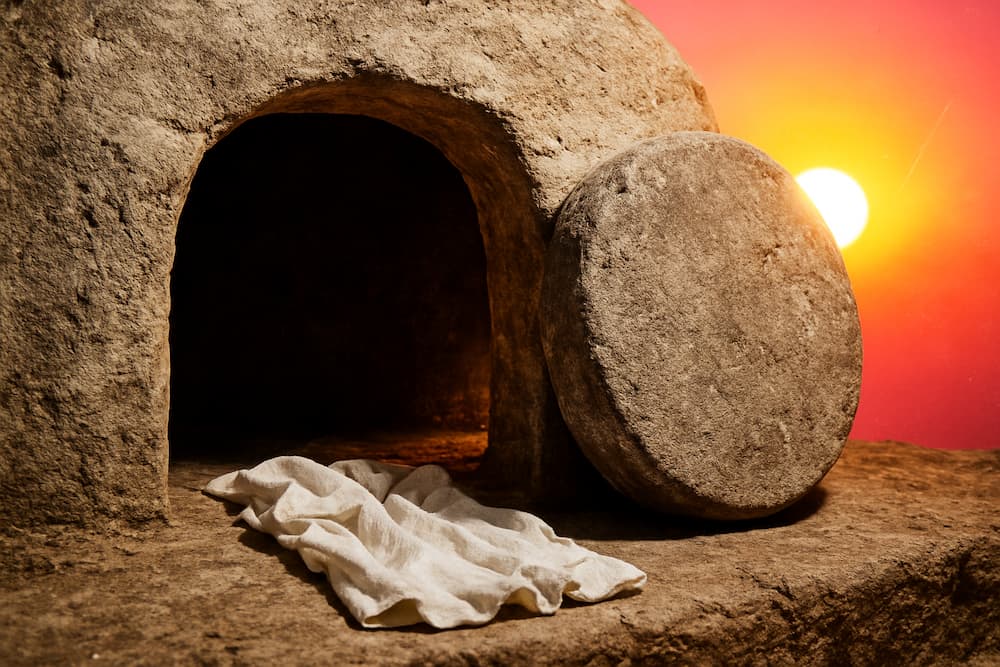What Did Jesus Say About “Quiet Time”?
What we need to get our minds around is that as great as quiet times can be, they are only a means to an end; and the end is an ongoing relationship with Christ that saturates everything.

And when you come before God, don't turn that into a theatrical production either. All these people making a regular show out of their prayers, hoping for stardom! Do you think God sits in a box seat? (Matthew 6:5, The Message)
“No Results.” Those are the words that popped up on the screen when I decided to do a search for the phrase quiet time in my favorite online Bible program.
I’m not kidding.
I looked in the Amplified Bible, the King James, New International, New American Standard and New Living Translations, and there were no results – not one single verse that included that phrase.
Not to be dissuaded, I ran a new search punching in several more versions. Again – “no results”. Quiet Time was simply nowhere to be found – not in the English Standard Version, New King James Version, or the Contemporary English Version – not even in Eugene Peterson’s The Message or obscure translations I’ve never heard of like the 21st Century King James Version or Young’s Literal translation.
So I started thinking about it and wondering – how in the world did something that is not once cited in any version of Scripture find its place at the top of our list of things every good Christian ought to be doing? Do you know what I mean? Think about the plethora of seminars and sermons and books and articles on a topic that wasn’t mentioned by Abraham or Moses or David or Isaiah or Jesus Himself, for that matter.
Why has having a quiet time garnered so much attention in Christian circles over the past few decades?
Now I know what you’re thinking, or at least I think I do. If we were sitting across a table talking about this, you would explain to me that while quiet time isn’t mentioned in Scripture, the spiritual disciplines we practice when we’re having one, like pray and meditate and worship, are.
And I would agree, but bear with me as I try to make a point.
Missing the Point of Time with God
The danger with this quiet time fixation is that it can actually end up hindering our intimacy with God. How? Many people, bound by some nebulous standard of what it is supposed to look like, give up before they get started, certain they’ll never make the grade.
Others get so bogged down with feelings of guilt and self-recrimination about their weaknesses and inconsistency, that they end up avoiding God altogether, certain He must be disappointed in them. Even those who do manage to master having a quiet time can easily get into the habit of saying ‘amen’ and then going their way each morning, oblivious to the fact that God wants to speak into the rest of their day, to stay closely connected with them in all that they do.
I’m not intent on killing any sacred cows here, but let me pose some questions I’ve collected from people over the years:
How many days a week do I need to have a quiet time?
How long should my quiet time be?
Do I have to have my quiet time in the morning?
What are the elements of a successful quiet time?
What percentage of the time should I spend interceding? Supplicating? Worshipping? Petitioning?
If I miss my quiet time can I do it later?
How can I keep from falling asleep in my quiet time?
Is God angry when I miss my quiet time?
How can I get myself to have a quiet time?
How can I get my husband to have a quiet time?
How can I get my teenager to have a quiet time?
How can I get my congregation to have a quiet time?
When I write these all together like this, it seems a miracle that anyone ever manages to enjoy developing their relationship with God.
What we need to get our minds around is that as great as quiet times can be, they are only a means to an end; and the end is an ongoing relationship with Christ that saturates everything – our waking and sleeping, our laughing and weeping, our playing and studying and working and exercising and driving and yes, our praying.
Quiet Time from the Perspective of Jesus
I wonder what we might think if we could see it from Jesus’ perspective.
There He stands at the door of our hearts; knocking, waiting, wanting us to know Him as our Father or Lover or Friend, and we get caught up in discussions about how much time is actually enough. He whispers our name, intent on pursuing intimacy with us and we breathe a sigh of relief if we manage to make it to prayer two days in a row.
He died that we might know Him personally – the very heart, He told us, of eternal life – and we search instead for a workable plan that will enable us to check one more thing off of our Christian to-do list. There is just something very wrong with this picture.
I was talking with a young woman once who was so bound up in this area that she couldn’t even conceive of time with God being a joyful experience. For years she’d vacillated between extreme discipline and careless indifference, never really connecting with the wonder of what God had for her in their times together. When we met, she was ready to throw in the towel and give up on prayer completely, it was just too frustrating.
I probably shocked her when instead of offering the latest and greatest helpful hints; I suggested that she try going for an entire month with no “quiet time” at all. What I was trying to do was remove the shoulds and oughts and dos and don’ts that had her tied in knots for years, so that she might finally discover a desire hidden deep within her soul to simply know the Lord who loves her with an everlasting love.
I’m not suggesting that we throw discipline out the window and resist having any sort of plan for prayer. Clearly, time set aside to meet with the Lord offers blessings we wouldn’t want to miss. It can be like drinking a glass of ice cold lemonade after tilling your garden in the hot sun, or finding a wadded up twenty dollar bill in the pocket of a jacket you haven’t worn since last year. Who wouldn’t want to experience such things?
The problem is that there are days when trying to spend time with God feels a whole lot more like ripping weeds out of that same garden or balancing a checkbook when there’s no money in the account. There is simply no ‘one size fits all’ when it comes to connecting with the sovereign and completely unpredictable Almighty.
Newfound Freedom in Quiet Tim
I guess that’s why I think we need to stop treating this particular discipline as a measuring stick for Christian maturity, a work we must get a grip on or suffer the consequence of living in constant condemnation. More than we realize, there is a subtle self-absorption in this that dishonors God and rebuffs His extensions of grace we so desperately need.
If we can just get past all the religious criterion and pressure to perform, we might discover a new-found freedom to enjoy Him in ways we never expected.
The above article is an excerpt from Tricia’s book, Sacred Chaos. Find it on Amazon here.
Sign Up for Product Updates
And when you come before God, don't turn that into a theatrical production either. All these people making a regular show out of their prayers, hoping for stardom! Do you think God sits in a box seat? (Matthew 6:5, The Message)
“No Results.” Those are the words that popped up on the screen when I decided to do a search for the phrase quiet time in my favorite online Bible program.
I’m not kidding.
I looked in the Amplified Bible, the King James, New International, New American Standard and New Living Translations, and there were no results – not one single verse that included that phrase.
Not to be dissuaded, I ran a new search punching in several more versions. Again – “no results”. Quiet Time was simply nowhere to be found – not in the English Standard Version, New King James Version, or the Contemporary English Version – not even in Eugene Peterson’s The Message or obscure translations I’ve never heard of like the 21st Century King James Version or Young’s Literal translation.
So I started thinking about it and wondering – how in the world did something that is not once cited in any version of Scripture find its place at the top of our list of things every good Christian ought to be doing? Do you know what I mean? Think about the plethora of seminars and sermons and books and articles on a topic that wasn’t mentioned by Abraham or Moses or David or Isaiah or Jesus Himself, for that matter.
Why has having a quiet time garnered so much attention in Christian circles over the past few decades?
Now I know what you’re thinking, or at least I think I do. If we were sitting across a table talking about this, you would explain to me that while quiet time isn’t mentioned in Scripture, the spiritual disciplines we practice when we’re having one, like pray and meditate and worship, are.
And I would agree, but bear with me as I try to make a point.
Missing the Point of Time with God
The danger with this quiet time fixation is that it can actually end up hindering our intimacy with God. How? Many people, bound by some nebulous standard of what it is supposed to look like, give up before they get started, certain they’ll never make the grade.
Others get so bogged down with feelings of guilt and self-recrimination about their weaknesses and inconsistency, that they end up avoiding God altogether, certain He must be disappointed in them. Even those who do manage to master having a quiet time can easily get into the habit of saying ‘amen’ and then going their way each morning, oblivious to the fact that God wants to speak into the rest of their day, to stay closely connected with them in all that they do.
I’m not intent on killing any sacred cows here, but let me pose some questions I’ve collected from people over the years:
How many days a week do I need to have a quiet time?
How long should my quiet time be?
Do I have to have my quiet time in the morning?
What are the elements of a successful quiet time?
What percentage of the time should I spend interceding? Supplicating? Worshipping? Petitioning?
If I miss my quiet time can I do it later?
How can I keep from falling asleep in my quiet time?
Is God angry when I miss my quiet time?
How can I get myself to have a quiet time?
How can I get my husband to have a quiet time?
How can I get my teenager to have a quiet time?
How can I get my congregation to have a quiet time?
When I write these all together like this, it seems a miracle that anyone ever manages to enjoy developing their relationship with God.
What we need to get our minds around is that as great as quiet times can be, they are only a means to an end; and the end is an ongoing relationship with Christ that saturates everything – our waking and sleeping, our laughing and weeping, our playing and studying and working and exercising and driving and yes, our praying.
Quiet Time from the Perspective of Jesus
I wonder what we might think if we could see it from Jesus’ perspective.
There He stands at the door of our hearts; knocking, waiting, wanting us to know Him as our Father or Lover or Friend, and we get caught up in discussions about how much time is actually enough. He whispers our name, intent on pursuing intimacy with us and we breathe a sigh of relief if we manage to make it to prayer two days in a row.
He died that we might know Him personally – the very heart, He told us, of eternal life – and we search instead for a workable plan that will enable us to check one more thing off of our Christian to-do list. There is just something very wrong with this picture.
I was talking with a young woman once who was so bound up in this area that she couldn’t even conceive of time with God being a joyful experience. For years she’d vacillated between extreme discipline and careless indifference, never really connecting with the wonder of what God had for her in their times together. When we met, she was ready to throw in the towel and give up on prayer completely, it was just too frustrating.
I probably shocked her when instead of offering the latest and greatest helpful hints; I suggested that she try going for an entire month with no “quiet time” at all. What I was trying to do was remove the shoulds and oughts and dos and don’ts that had her tied in knots for years, so that she might finally discover a desire hidden deep within her soul to simply know the Lord who loves her with an everlasting love.
I’m not suggesting that we throw discipline out the window and resist having any sort of plan for prayer. Clearly, time set aside to meet with the Lord offers blessings we wouldn’t want to miss. It can be like drinking a glass of ice cold lemonade after tilling your garden in the hot sun, or finding a wadded up twenty dollar bill in the pocket of a jacket you haven’t worn since last year. Who wouldn’t want to experience such things?
The problem is that there are days when trying to spend time with God feels a whole lot more like ripping weeds out of that same garden or balancing a checkbook when there’s no money in the account. There is simply no ‘one size fits all’ when it comes to connecting with the sovereign and completely unpredictable Almighty.
Newfound Freedom in Quiet Tim
I guess that’s why I think we need to stop treating this particular discipline as a measuring stick for Christian maturity, a work we must get a grip on or suffer the consequence of living in constant condemnation. More than we realize, there is a subtle self-absorption in this that dishonors God and rebuffs His extensions of grace we so desperately need.
If we can just get past all the religious criterion and pressure to perform, we might discover a new-found freedom to enjoy Him in ways we never expected.
The above article is an excerpt from Tricia’s book, Sacred Chaos. Find it on Amazon here.
podcast transcript
And when you come before God, don't turn that into a theatrical production either. All these people making a regular show out of their prayers, hoping for stardom! Do you think God sits in a box seat? (Matthew 6:5, The Message)
“No Results.” Those are the words that popped up on the screen when I decided to do a search for the phrase quiet time in my favorite online Bible program.
I’m not kidding.
I looked in the Amplified Bible, the King James, New International, New American Standard and New Living Translations, and there were no results – not one single verse that included that phrase.
Not to be dissuaded, I ran a new search punching in several more versions. Again – “no results”. Quiet Time was simply nowhere to be found – not in the English Standard Version, New King James Version, or the Contemporary English Version – not even in Eugene Peterson’s The Message or obscure translations I’ve never heard of like the 21st Century King James Version or Young’s Literal translation.
So I started thinking about it and wondering – how in the world did something that is not once cited in any version of Scripture find its place at the top of our list of things every good Christian ought to be doing? Do you know what I mean? Think about the plethora of seminars and sermons and books and articles on a topic that wasn’t mentioned by Abraham or Moses or David or Isaiah or Jesus Himself, for that matter.
Why has having a quiet time garnered so much attention in Christian circles over the past few decades?
Now I know what you’re thinking, or at least I think I do. If we were sitting across a table talking about this, you would explain to me that while quiet time isn’t mentioned in Scripture, the spiritual disciplines we practice when we’re having one, like pray and meditate and worship, are.
And I would agree, but bear with me as I try to make a point.
Missing the Point of Time with God
The danger with this quiet time fixation is that it can actually end up hindering our intimacy with God. How? Many people, bound by some nebulous standard of what it is supposed to look like, give up before they get started, certain they’ll never make the grade.
Others get so bogged down with feelings of guilt and self-recrimination about their weaknesses and inconsistency, that they end up avoiding God altogether, certain He must be disappointed in them. Even those who do manage to master having a quiet time can easily get into the habit of saying ‘amen’ and then going their way each morning, oblivious to the fact that God wants to speak into the rest of their day, to stay closely connected with them in all that they do.
I’m not intent on killing any sacred cows here, but let me pose some questions I’ve collected from people over the years:
How many days a week do I need to have a quiet time?
How long should my quiet time be?
Do I have to have my quiet time in the morning?
What are the elements of a successful quiet time?
What percentage of the time should I spend interceding? Supplicating? Worshipping? Petitioning?
If I miss my quiet time can I do it later?
How can I keep from falling asleep in my quiet time?
Is God angry when I miss my quiet time?
How can I get myself to have a quiet time?
How can I get my husband to have a quiet time?
How can I get my teenager to have a quiet time?
How can I get my congregation to have a quiet time?
When I write these all together like this, it seems a miracle that anyone ever manages to enjoy developing their relationship with God.
What we need to get our minds around is that as great as quiet times can be, they are only a means to an end; and the end is an ongoing relationship with Christ that saturates everything – our waking and sleeping, our laughing and weeping, our playing and studying and working and exercising and driving and yes, our praying.
Quiet Time from the Perspective of Jesus
I wonder what we might think if we could see it from Jesus’ perspective.
There He stands at the door of our hearts; knocking, waiting, wanting us to know Him as our Father or Lover or Friend, and we get caught up in discussions about how much time is actually enough. He whispers our name, intent on pursuing intimacy with us and we breathe a sigh of relief if we manage to make it to prayer two days in a row.
He died that we might know Him personally – the very heart, He told us, of eternal life – and we search instead for a workable plan that will enable us to check one more thing off of our Christian to-do list. There is just something very wrong with this picture.
I was talking with a young woman once who was so bound up in this area that she couldn’t even conceive of time with God being a joyful experience. For years she’d vacillated between extreme discipline and careless indifference, never really connecting with the wonder of what God had for her in their times together. When we met, she was ready to throw in the towel and give up on prayer completely, it was just too frustrating.
I probably shocked her when instead of offering the latest and greatest helpful hints; I suggested that she try going for an entire month with no “quiet time” at all. What I was trying to do was remove the shoulds and oughts and dos and don’ts that had her tied in knots for years, so that she might finally discover a desire hidden deep within her soul to simply know the Lord who loves her with an everlasting love.
I’m not suggesting that we throw discipline out the window and resist having any sort of plan for prayer. Clearly, time set aside to meet with the Lord offers blessings we wouldn’t want to miss. It can be like drinking a glass of ice cold lemonade after tilling your garden in the hot sun, or finding a wadded up twenty dollar bill in the pocket of a jacket you haven’t worn since last year. Who wouldn’t want to experience such things?
The problem is that there are days when trying to spend time with God feels a whole lot more like ripping weeds out of that same garden or balancing a checkbook when there’s no money in the account. There is simply no ‘one size fits all’ when it comes to connecting with the sovereign and completely unpredictable Almighty.
Newfound Freedom in Quiet Tim
I guess that’s why I think we need to stop treating this particular discipline as a measuring stick for Christian maturity, a work we must get a grip on or suffer the consequence of living in constant condemnation. More than we realize, there is a subtle self-absorption in this that dishonors God and rebuffs His extensions of grace we so desperately need.
If we can just get past all the religious criterion and pressure to perform, we might discover a new-found freedom to enjoy Him in ways we never expected.
The above article is an excerpt from Tricia’s book, Sacred Chaos. Find it on Amazon here.
VIDEO transcript
And when you come before God, don't turn that into a theatrical production either. All these people making a regular show out of their prayers, hoping for stardom! Do you think God sits in a box seat? (Matthew 6:5, The Message)
“No Results.” Those are the words that popped up on the screen when I decided to do a search for the phrase quiet time in my favorite online Bible program.
I’m not kidding.
I looked in the Amplified Bible, the King James, New International, New American Standard and New Living Translations, and there were no results – not one single verse that included that phrase.
Not to be dissuaded, I ran a new search punching in several more versions. Again – “no results”. Quiet Time was simply nowhere to be found – not in the English Standard Version, New King James Version, or the Contemporary English Version – not even in Eugene Peterson’s The Message or obscure translations I’ve never heard of like the 21st Century King James Version or Young’s Literal translation.
So I started thinking about it and wondering – how in the world did something that is not once cited in any version of Scripture find its place at the top of our list of things every good Christian ought to be doing? Do you know what I mean? Think about the plethora of seminars and sermons and books and articles on a topic that wasn’t mentioned by Abraham or Moses or David or Isaiah or Jesus Himself, for that matter.
Why has having a quiet time garnered so much attention in Christian circles over the past few decades?
Now I know what you’re thinking, or at least I think I do. If we were sitting across a table talking about this, you would explain to me that while quiet time isn’t mentioned in Scripture, the spiritual disciplines we practice when we’re having one, like pray and meditate and worship, are.
And I would agree, but bear with me as I try to make a point.
Missing the Point of Time with God
The danger with this quiet time fixation is that it can actually end up hindering our intimacy with God. How? Many people, bound by some nebulous standard of what it is supposed to look like, give up before they get started, certain they’ll never make the grade.
Others get so bogged down with feelings of guilt and self-recrimination about their weaknesses and inconsistency, that they end up avoiding God altogether, certain He must be disappointed in them. Even those who do manage to master having a quiet time can easily get into the habit of saying ‘amen’ and then going their way each morning, oblivious to the fact that God wants to speak into the rest of their day, to stay closely connected with them in all that they do.
I’m not intent on killing any sacred cows here, but let me pose some questions I’ve collected from people over the years:
How many days a week do I need to have a quiet time?
How long should my quiet time be?
Do I have to have my quiet time in the morning?
What are the elements of a successful quiet time?
What percentage of the time should I spend interceding? Supplicating? Worshipping? Petitioning?
If I miss my quiet time can I do it later?
How can I keep from falling asleep in my quiet time?
Is God angry when I miss my quiet time?
How can I get myself to have a quiet time?
How can I get my husband to have a quiet time?
How can I get my teenager to have a quiet time?
How can I get my congregation to have a quiet time?
When I write these all together like this, it seems a miracle that anyone ever manages to enjoy developing their relationship with God.
What we need to get our minds around is that as great as quiet times can be, they are only a means to an end; and the end is an ongoing relationship with Christ that saturates everything – our waking and sleeping, our laughing and weeping, our playing and studying and working and exercising and driving and yes, our praying.
Quiet Time from the Perspective of Jesus
I wonder what we might think if we could see it from Jesus’ perspective.
There He stands at the door of our hearts; knocking, waiting, wanting us to know Him as our Father or Lover or Friend, and we get caught up in discussions about how much time is actually enough. He whispers our name, intent on pursuing intimacy with us and we breathe a sigh of relief if we manage to make it to prayer two days in a row.
He died that we might know Him personally – the very heart, He told us, of eternal life – and we search instead for a workable plan that will enable us to check one more thing off of our Christian to-do list. There is just something very wrong with this picture.
I was talking with a young woman once who was so bound up in this area that she couldn’t even conceive of time with God being a joyful experience. For years she’d vacillated between extreme discipline and careless indifference, never really connecting with the wonder of what God had for her in their times together. When we met, she was ready to throw in the towel and give up on prayer completely, it was just too frustrating.
I probably shocked her when instead of offering the latest and greatest helpful hints; I suggested that she try going for an entire month with no “quiet time” at all. What I was trying to do was remove the shoulds and oughts and dos and don’ts that had her tied in knots for years, so that she might finally discover a desire hidden deep within her soul to simply know the Lord who loves her with an everlasting love.
I’m not suggesting that we throw discipline out the window and resist having any sort of plan for prayer. Clearly, time set aside to meet with the Lord offers blessings we wouldn’t want to miss. It can be like drinking a glass of ice cold lemonade after tilling your garden in the hot sun, or finding a wadded up twenty dollar bill in the pocket of a jacket you haven’t worn since last year. Who wouldn’t want to experience such things?
The problem is that there are days when trying to spend time with God feels a whole lot more like ripping weeds out of that same garden or balancing a checkbook when there’s no money in the account. There is simply no ‘one size fits all’ when it comes to connecting with the sovereign and completely unpredictable Almighty.
Newfound Freedom in Quiet Tim
I guess that’s why I think we need to stop treating this particular discipline as a measuring stick for Christian maturity, a work we must get a grip on or suffer the consequence of living in constant condemnation. More than we realize, there is a subtle self-absorption in this that dishonors God and rebuffs His extensions of grace we so desperately need.
If we can just get past all the religious criterion and pressure to perform, we might discover a new-found freedom to enjoy Him in ways we never expected.
The above article is an excerpt from Tricia’s book, Sacred Chaos. Find it on Amazon here.




























